A Detailed Report on Organisational Behaviour Principles at 4com Plc
VerifiedAdded on 2021/01/02
|19
|4879
|228
Report
AI Summary
This report provides an in-depth analysis of organisational behaviour principles, focusing on 4com Plc as a case study. It explores the influence of organisational culture, politics, and power on individual and team behaviour and performance. The report delves into content and process theories of motivation, including Maslow's hierarchy of needs, Alderfer's ERG theory, and Adam's equity theory, to understand how motivational techniques enable effective achievement of goals. Furthermore, it differentiates between effective and ineffective teams, outlining key characteristics and providing insights into team dynamics. The report also applies concepts and philosophies of organisational behaviour, offering a comprehensive understanding of how these elements interact to shape employee behaviour and overall organisational success.
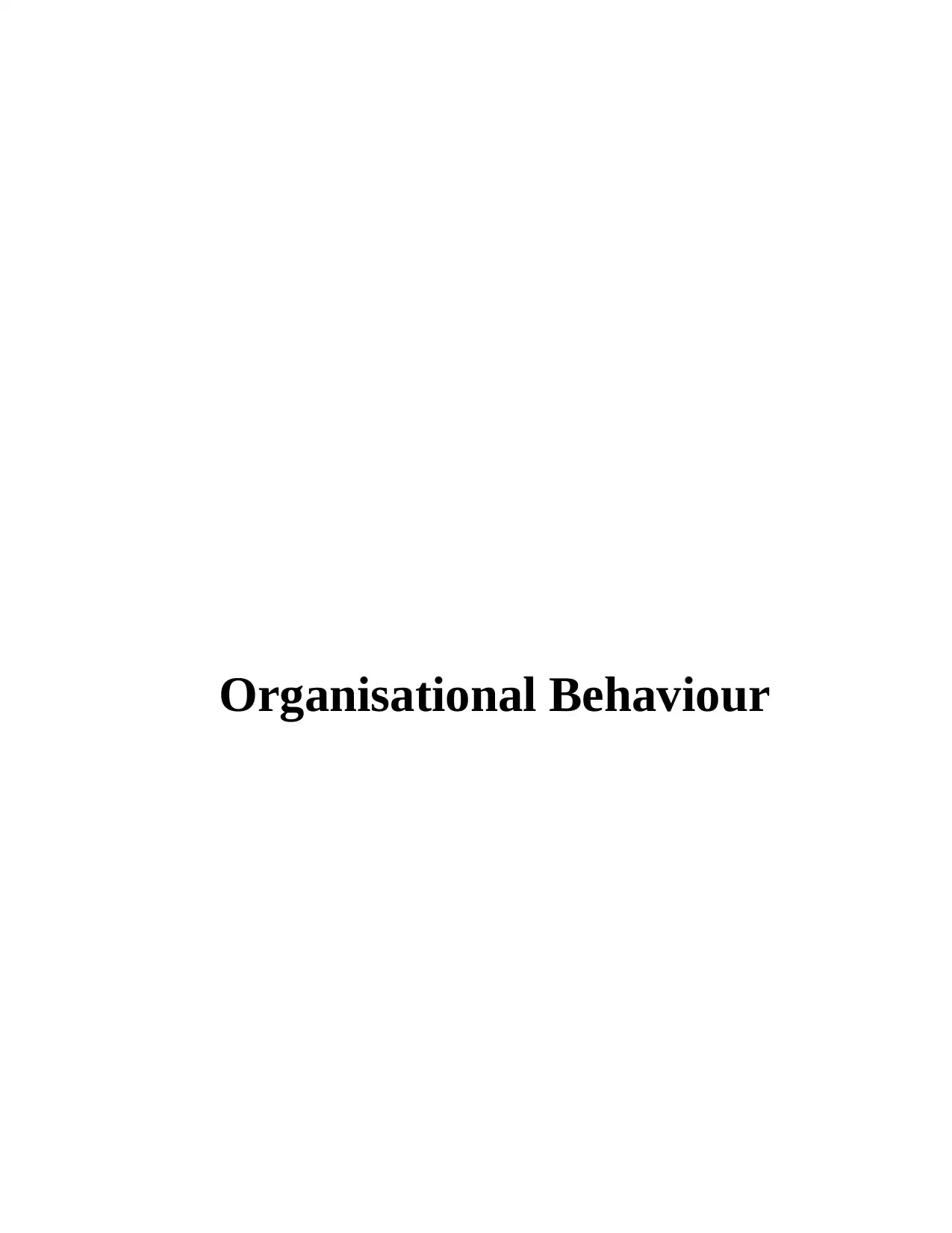
Organisational Behaviour
Paraphrase This Document
Need a fresh take? Get an instant paraphrase of this document with our AI Paraphraser
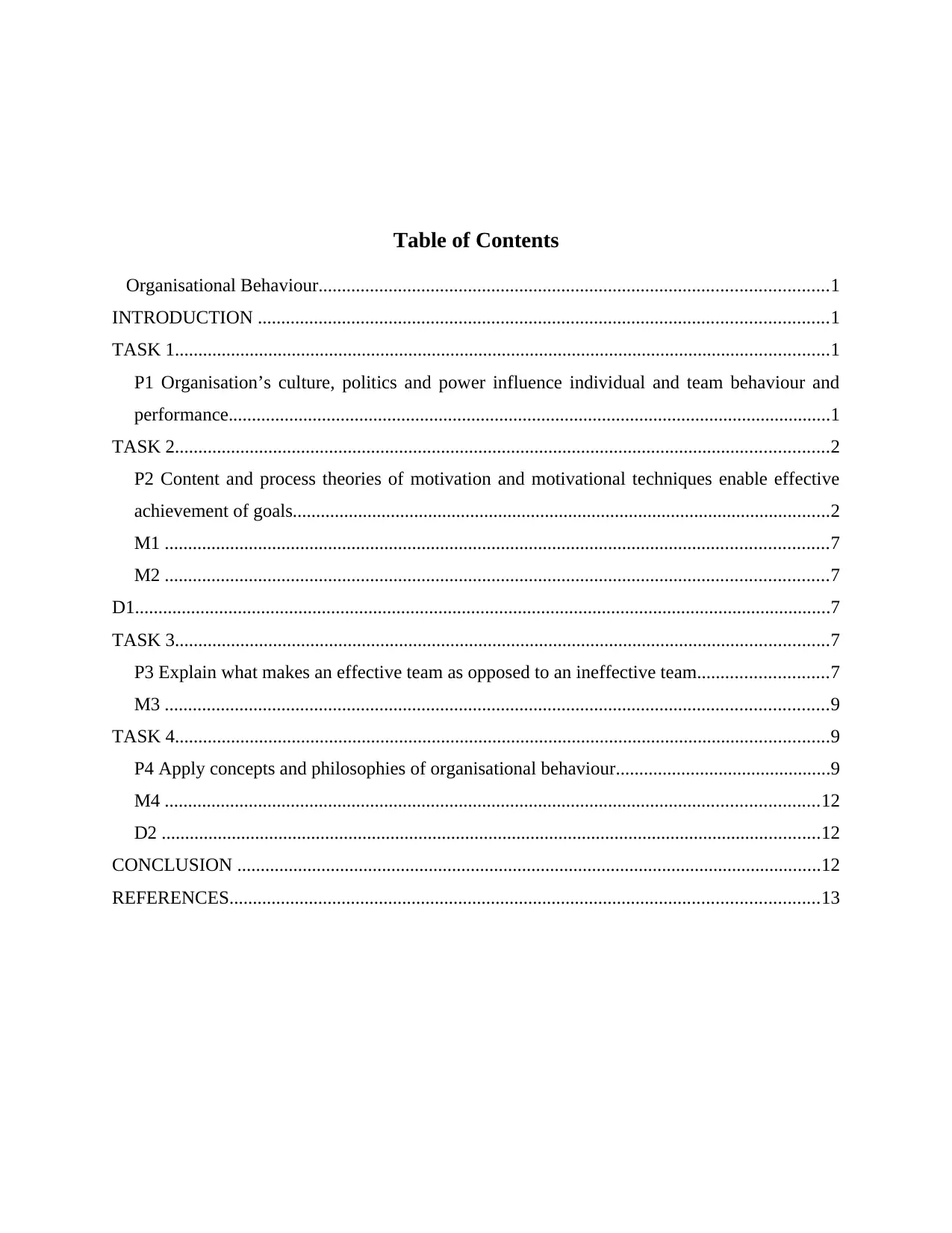
Table of Contents
Organisational Behaviour.............................................................................................................1
INTRODUCTION ..........................................................................................................................1
TASK 1............................................................................................................................................1
P1 Organisation’s culture, politics and power influence individual and team behaviour and
performance.................................................................................................................................1
TASK 2............................................................................................................................................2
P2 Content and process theories of motivation and motivational techniques enable effective
achievement of goals...................................................................................................................2
M1 ..............................................................................................................................................7
M2 ..............................................................................................................................................7
D1.....................................................................................................................................................7
TASK 3............................................................................................................................................7
P3 Explain what makes an effective team as opposed to an ineffective team............................7
M3 ..............................................................................................................................................9
TASK 4............................................................................................................................................9
P4 Apply concepts and philosophies of organisational behaviour..............................................9
M4 ............................................................................................................................................12
D2 .............................................................................................................................................12
CONCLUSION .............................................................................................................................12
REFERENCES..............................................................................................................................13
Organisational Behaviour.............................................................................................................1
INTRODUCTION ..........................................................................................................................1
TASK 1............................................................................................................................................1
P1 Organisation’s culture, politics and power influence individual and team behaviour and
performance.................................................................................................................................1
TASK 2............................................................................................................................................2
P2 Content and process theories of motivation and motivational techniques enable effective
achievement of goals...................................................................................................................2
M1 ..............................................................................................................................................7
M2 ..............................................................................................................................................7
D1.....................................................................................................................................................7
TASK 3............................................................................................................................................7
P3 Explain what makes an effective team as opposed to an ineffective team............................7
M3 ..............................................................................................................................................9
TASK 4............................................................................................................................................9
P4 Apply concepts and philosophies of organisational behaviour..............................................9
M4 ............................................................................................................................................12
D2 .............................................................................................................................................12
CONCLUSION .............................................................................................................................12
REFERENCES..............................................................................................................................13
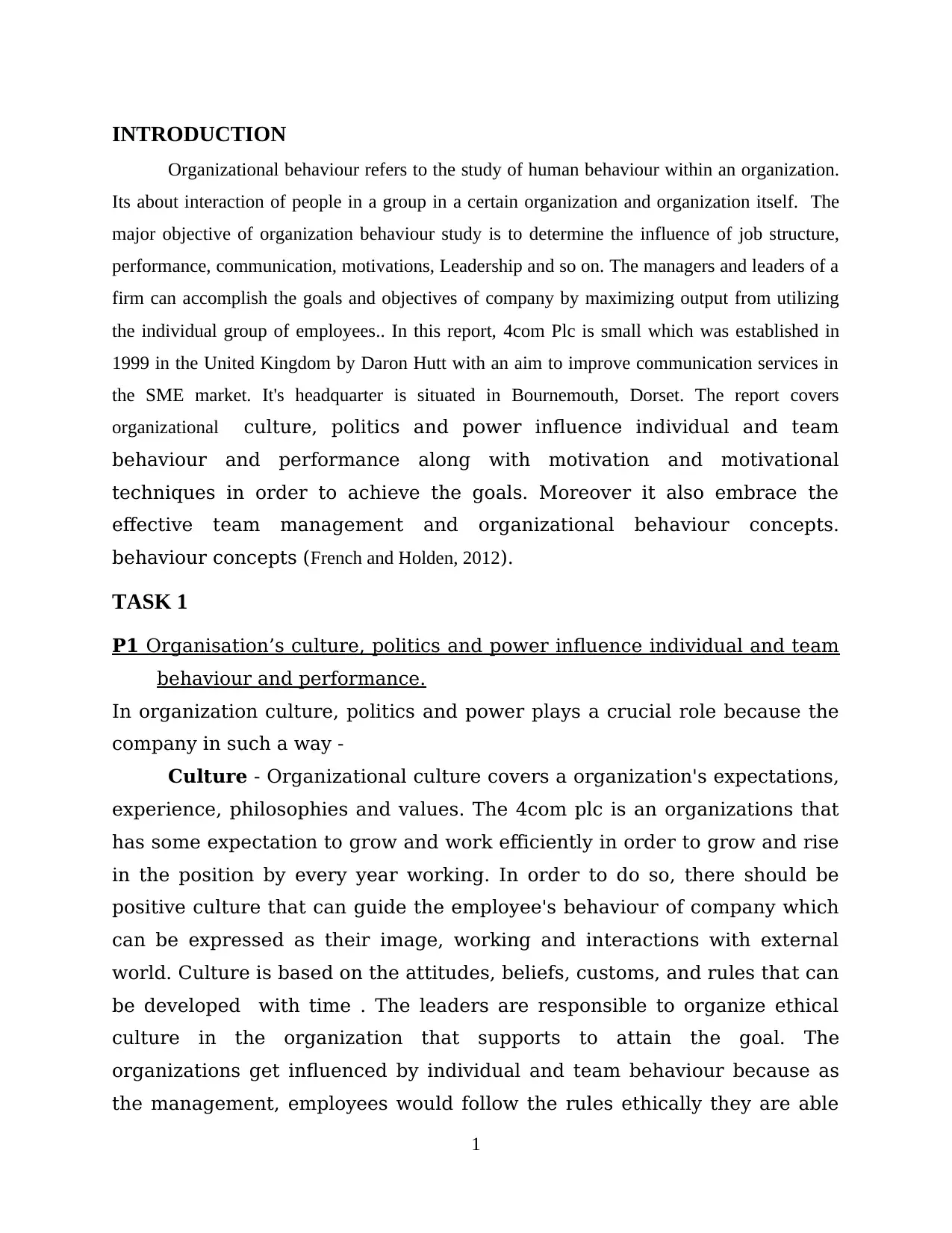
INTRODUCTION
Organizational behaviour refers to the study of human behaviour within an organization.
Its about interaction of people in a group in a certain organization and organization itself. The
major objective of organization behaviour study is to determine the influence of job structure,
performance, communication, motivations, Leadership and so on. The managers and leaders of a
firm can accomplish the goals and objectives of company by maximizing output from utilizing
the individual group of employees.. In this report, 4com Plc is small which was established in
1999 in the United Kingdom by Daron Hutt with an aim to improve communication services in
the SME market. It's headquarter is situated in Bournemouth, Dorset. The report covers
organizational culture, politics and power influence individual and team
behaviour and performance along with motivation and motivational
techniques in order to achieve the goals. Moreover it also embrace the
effective team management and organizational behaviour concepts.
behaviour concepts (French and Holden, 2012).
TASK 1
P1 Organisation’s culture, politics and power influence individual and team
behaviour and performance.
In organization culture, politics and power plays a crucial role because the
company in such a way -
Culture - Organizational culture covers a organization's expectations,
experience, philosophies and values. The 4com plc is an organizations that
has some expectation to grow and work efficiently in order to grow and rise
in the position by every year working. In order to do so, there should be
positive culture that can guide the employee's behaviour of company which
can be expressed as their image, working and interactions with external
world. Culture is based on the attitudes, beliefs, customs, and rules that can
be developed with time . The leaders are responsible to organize ethical
culture in the organization that supports to attain the goal. The
organizations get influenced by individual and team behaviour because as
the management, employees would follow the rules ethically they are able
1
Organizational behaviour refers to the study of human behaviour within an organization.
Its about interaction of people in a group in a certain organization and organization itself. The
major objective of organization behaviour study is to determine the influence of job structure,
performance, communication, motivations, Leadership and so on. The managers and leaders of a
firm can accomplish the goals and objectives of company by maximizing output from utilizing
the individual group of employees.. In this report, 4com Plc is small which was established in
1999 in the United Kingdom by Daron Hutt with an aim to improve communication services in
the SME market. It's headquarter is situated in Bournemouth, Dorset. The report covers
organizational culture, politics and power influence individual and team
behaviour and performance along with motivation and motivational
techniques in order to achieve the goals. Moreover it also embrace the
effective team management and organizational behaviour concepts.
behaviour concepts (French and Holden, 2012).
TASK 1
P1 Organisation’s culture, politics and power influence individual and team
behaviour and performance.
In organization culture, politics and power plays a crucial role because the
company in such a way -
Culture - Organizational culture covers a organization's expectations,
experience, philosophies and values. The 4com plc is an organizations that
has some expectation to grow and work efficiently in order to grow and rise
in the position by every year working. In order to do so, there should be
positive culture that can guide the employee's behaviour of company which
can be expressed as their image, working and interactions with external
world. Culture is based on the attitudes, beliefs, customs, and rules that can
be developed with time . The leaders are responsible to organize ethical
culture in the organization that supports to attain the goal. The
organizations get influenced by individual and team behaviour because as
the management, employees would follow the rules ethically they are able
1
⊘ This is a preview!⊘
Do you want full access?
Subscribe today to unlock all pages.

Trusted by 1+ million students worldwide
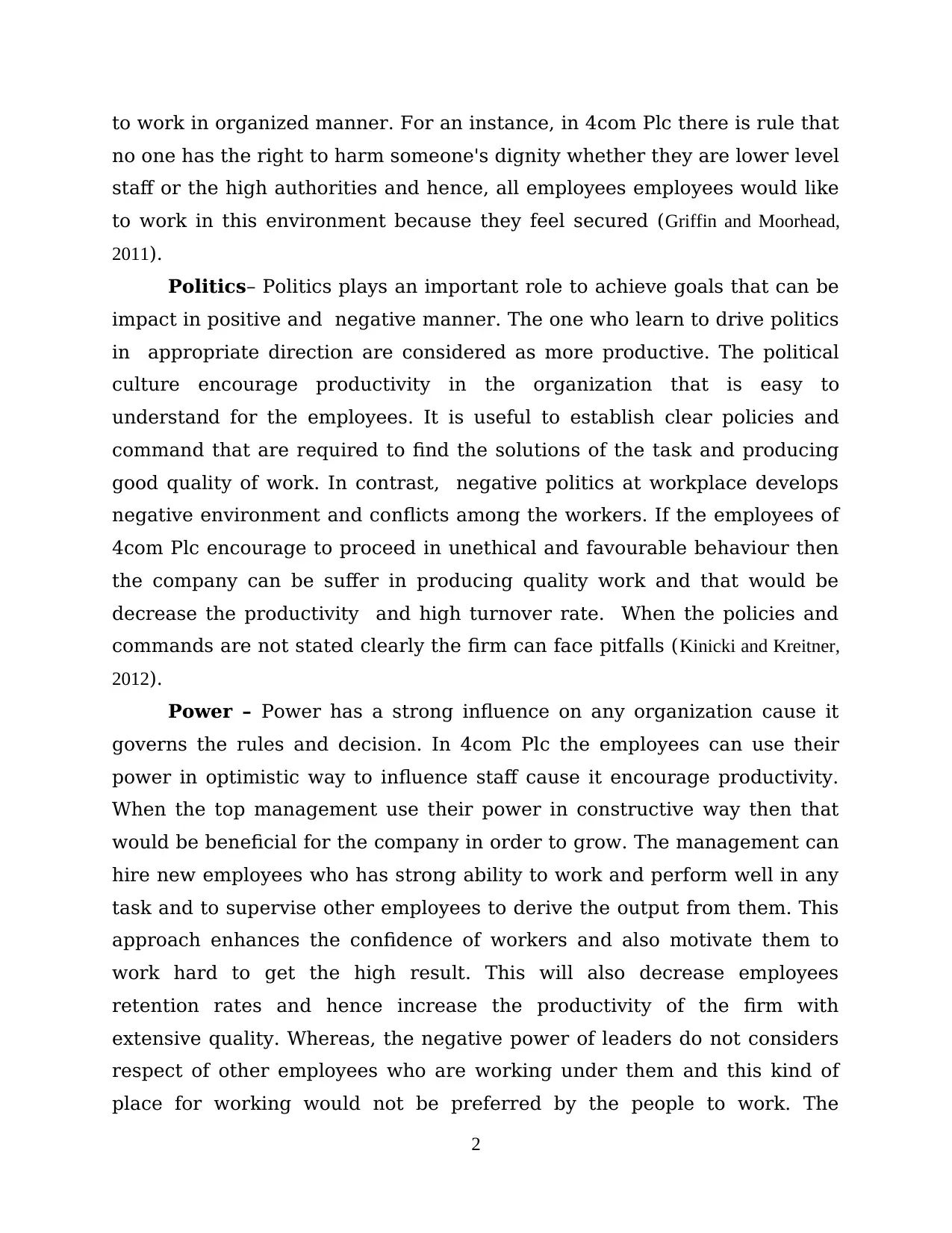
to work in organized manner. For an instance, in 4com Plc there is rule that
no one has the right to harm someone's dignity whether they are lower level
staff or the high authorities and hence, all employees employees would like
to work in this environment because they feel secured (Griffin and Moorhead,
2011).
Politics– Politics plays an important role to achieve goals that can be
impact in positive and negative manner. The one who learn to drive politics
in appropriate direction are considered as more productive. The political
culture encourage productivity in the organization that is easy to
understand for the employees. It is useful to establish clear policies and
command that are required to find the solutions of the task and producing
good quality of work. In contrast, negative politics at workplace develops
negative environment and conflicts among the workers. If the employees of
4com Plc encourage to proceed in unethical and favourable behaviour then
the company can be suffer in producing quality work and that would be
decrease the productivity and high turnover rate. When the policies and
commands are not stated clearly the firm can face pitfalls (Kinicki and Kreitner,
2012).
Power – Power has a strong influence on any organization cause it
governs the rules and decision. In 4com Plc the employees can use their
power in optimistic way to influence staff cause it encourage productivity.
When the top management use their power in constructive way then that
would be beneficial for the company in order to grow. The management can
hire new employees who has strong ability to work and perform well in any
task and to supervise other employees to derive the output from them. This
approach enhances the confidence of workers and also motivate them to
work hard to get the high result. This will also decrease employees
retention rates and hence increase the productivity of the firm with
extensive quality. Whereas, the negative power of leaders do not considers
respect of other employees who are working under them and this kind of
place for working would not be preferred by the people to work. The
2
no one has the right to harm someone's dignity whether they are lower level
staff or the high authorities and hence, all employees employees would like
to work in this environment because they feel secured (Griffin and Moorhead,
2011).
Politics– Politics plays an important role to achieve goals that can be
impact in positive and negative manner. The one who learn to drive politics
in appropriate direction are considered as more productive. The political
culture encourage productivity in the organization that is easy to
understand for the employees. It is useful to establish clear policies and
command that are required to find the solutions of the task and producing
good quality of work. In contrast, negative politics at workplace develops
negative environment and conflicts among the workers. If the employees of
4com Plc encourage to proceed in unethical and favourable behaviour then
the company can be suffer in producing quality work and that would be
decrease the productivity and high turnover rate. When the policies and
commands are not stated clearly the firm can face pitfalls (Kinicki and Kreitner,
2012).
Power – Power has a strong influence on any organization cause it
governs the rules and decision. In 4com Plc the employees can use their
power in optimistic way to influence staff cause it encourage productivity.
When the top management use their power in constructive way then that
would be beneficial for the company in order to grow. The management can
hire new employees who has strong ability to work and perform well in any
task and to supervise other employees to derive the output from them. This
approach enhances the confidence of workers and also motivate them to
work hard to get the high result. This will also decrease employees
retention rates and hence increase the productivity of the firm with
extensive quality. Whereas, the negative power of leaders do not considers
respect of other employees who are working under them and this kind of
place for working would not be preferred by the people to work. The
2
Paraphrase This Document
Need a fresh take? Get an instant paraphrase of this document with our AI Paraphraser
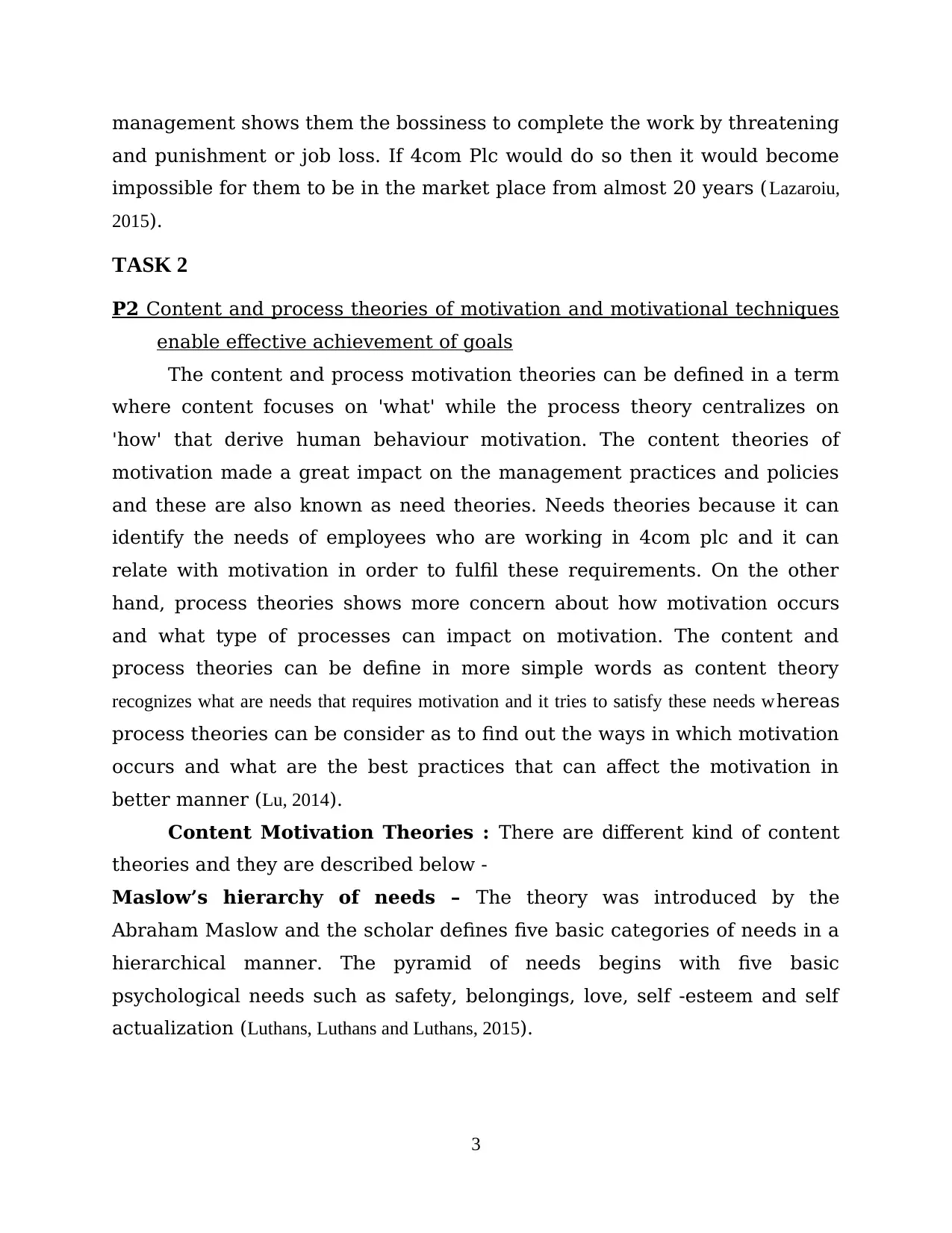
management shows them the bossiness to complete the work by threatening
and punishment or job loss. If 4com Plc would do so then it would become
impossible for them to be in the market place from almost 20 years (Lazaroiu,
2015).
TASK 2
P2 Content and process theories of motivation and motivational techniques
enable effective achievement of goals
The content and process motivation theories can be defined in a term
where content focuses on 'what' while the process theory centralizes on
'how' that derive human behaviour motivation. The content theories of
motivation made a great impact on the management practices and policies
and these are also known as need theories. Needs theories because it can
identify the needs of employees who are working in 4com plc and it can
relate with motivation in order to fulfil these requirements. On the other
hand, process theories shows more concern about how motivation occurs
and what type of processes can impact on motivation. The content and
process theories can be define in more simple words as content theory
recognizes what are needs that requires motivation and it tries to satisfy these needs whereas
process theories can be consider as to find out the ways in which motivation
occurs and what are the best practices that can affect the motivation in
better manner (Lu, 2014).
Content Motivation Theories : There are different kind of content
theories and they are described below -
Maslow’s hierarchy of needs – The theory was introduced by the
Abraham Maslow and the scholar defines five basic categories of needs in a
hierarchical manner. The pyramid of needs begins with five basic
psychological needs such as safety, belongings, love, self -esteem and self
actualization (Luthans, Luthans and Luthans, 2015).
3
and punishment or job loss. If 4com Plc would do so then it would become
impossible for them to be in the market place from almost 20 years (Lazaroiu,
2015).
TASK 2
P2 Content and process theories of motivation and motivational techniques
enable effective achievement of goals
The content and process motivation theories can be defined in a term
where content focuses on 'what' while the process theory centralizes on
'how' that derive human behaviour motivation. The content theories of
motivation made a great impact on the management practices and policies
and these are also known as need theories. Needs theories because it can
identify the needs of employees who are working in 4com plc and it can
relate with motivation in order to fulfil these requirements. On the other
hand, process theories shows more concern about how motivation occurs
and what type of processes can impact on motivation. The content and
process theories can be define in more simple words as content theory
recognizes what are needs that requires motivation and it tries to satisfy these needs whereas
process theories can be consider as to find out the ways in which motivation
occurs and what are the best practices that can affect the motivation in
better manner (Lu, 2014).
Content Motivation Theories : There are different kind of content
theories and they are described below -
Maslow’s hierarchy of needs – The theory was introduced by the
Abraham Maslow and the scholar defines five basic categories of needs in a
hierarchical manner. The pyramid of needs begins with five basic
psychological needs such as safety, belongings, love, self -esteem and self
actualization (Luthans, Luthans and Luthans, 2015).
3
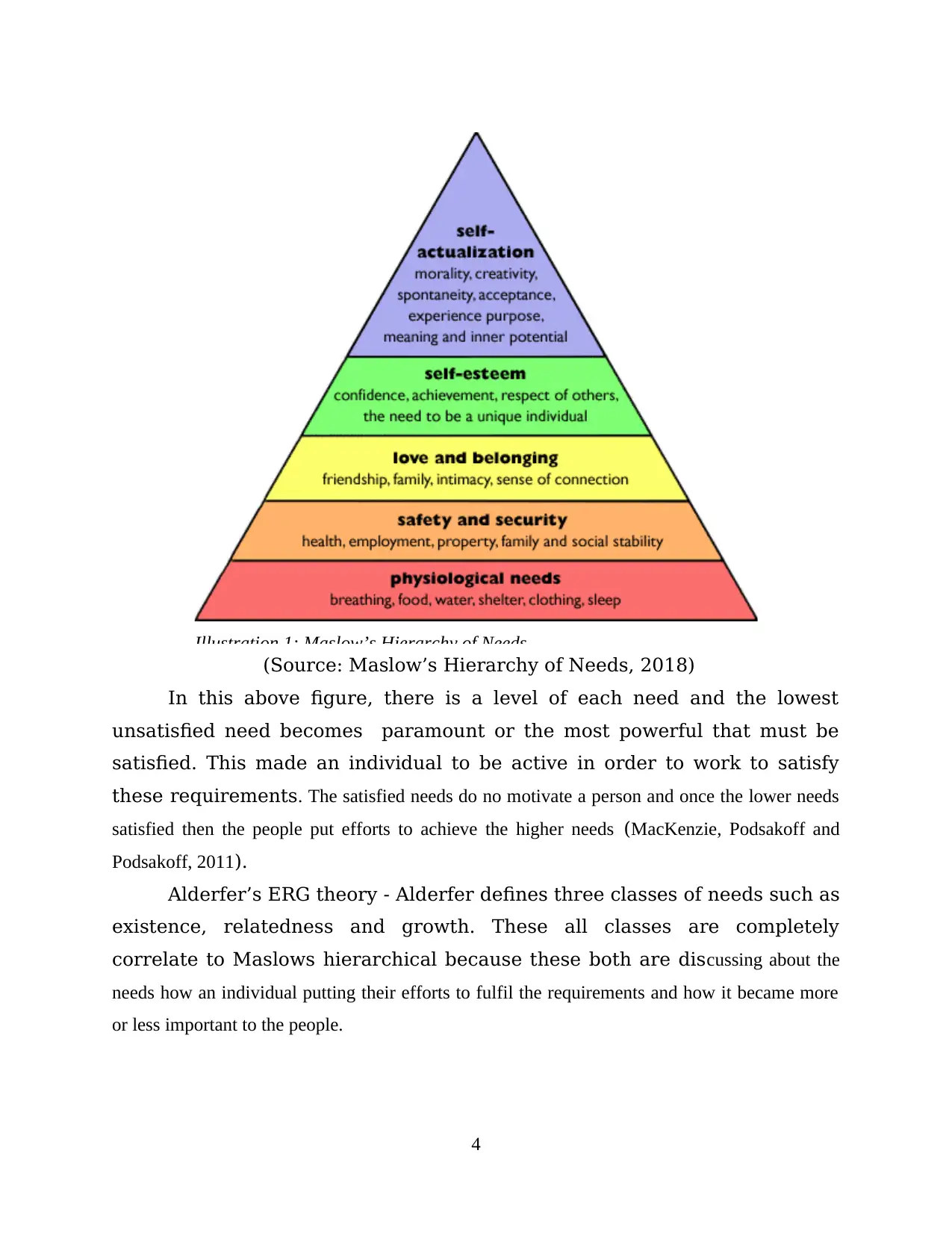
(Source: Maslow’s Hierarchy of Needs, 2018)
In this above figure, there is a level of each need and the lowest
unsatisfied need becomes paramount or the most powerful that must be
satisfied. This made an individual to be active in order to work to satisfy
these requirements. The satisfied needs do no motivate a person and once the lower needs
satisfied then the people put efforts to achieve the higher needs (MacKenzie, Podsakoff and
Podsakoff, 2011).
Alderfer’s ERG theory - Alderfer defines three classes of needs such as
existence, relatedness and growth. These all classes are completely
correlate to Maslows hierarchical because these both are discussing about the
needs how an individual putting their efforts to fulfil the requirements and how it became more
or less important to the people.
4
Illustration 1: Maslow’s Hierarchy of Needs
In this above figure, there is a level of each need and the lowest
unsatisfied need becomes paramount or the most powerful that must be
satisfied. This made an individual to be active in order to work to satisfy
these requirements. The satisfied needs do no motivate a person and once the lower needs
satisfied then the people put efforts to achieve the higher needs (MacKenzie, Podsakoff and
Podsakoff, 2011).
Alderfer’s ERG theory - Alderfer defines three classes of needs such as
existence, relatedness and growth. These all classes are completely
correlate to Maslows hierarchical because these both are discussing about the
needs how an individual putting their efforts to fulfil the requirements and how it became more
or less important to the people.
4
Illustration 1: Maslow’s Hierarchy of Needs
⊘ This is a preview!⊘
Do you want full access?
Subscribe today to unlock all pages.

Trusted by 1+ million students worldwide
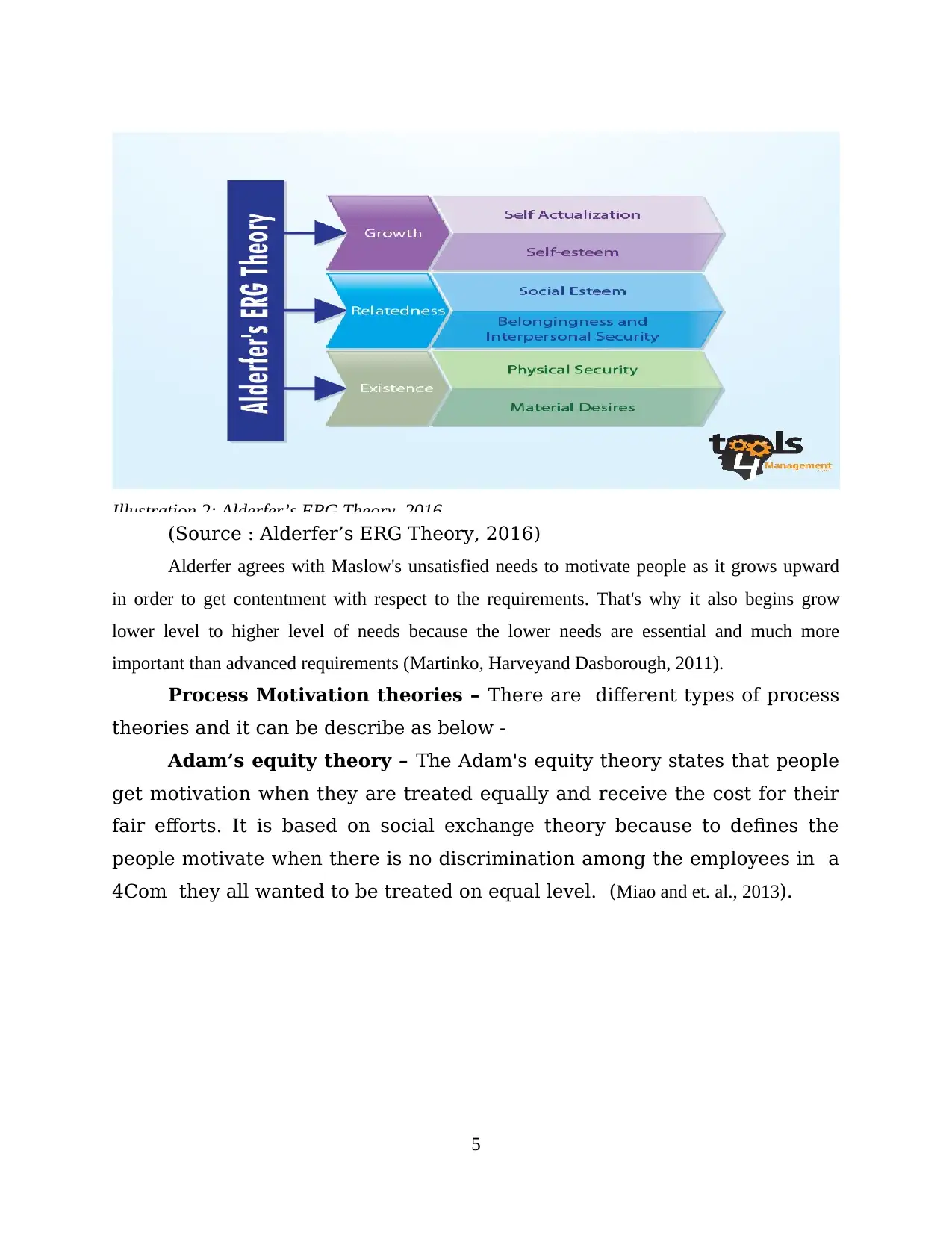
(Source : Alderfer’s ERG Theory, 2016)
Alderfer agrees with Maslow's unsatisfied needs to motivate people as it grows upward
in order to get contentment with respect to the requirements. That's why it also begins grow
lower level to higher level of needs because the lower needs are essential and much more
important than advanced requirements (Martinko, Harveyand Dasborough, 2011).
Process Motivation theories – There are different types of process
theories and it can be describe as below -
Adam’s equity theory – The Adam's equity theory states that people
get motivation when they are treated equally and receive the cost for their
fair efforts. It is based on social exchange theory because to defines the
people motivate when there is no discrimination among the employees in a
4Com they all wanted to be treated on equal level. (Miao and et. al., 2013).
5
Illustration 2: Alderfer’s ERG Theory, 2016
Alderfer agrees with Maslow's unsatisfied needs to motivate people as it grows upward
in order to get contentment with respect to the requirements. That's why it also begins grow
lower level to higher level of needs because the lower needs are essential and much more
important than advanced requirements (Martinko, Harveyand Dasborough, 2011).
Process Motivation theories – There are different types of process
theories and it can be describe as below -
Adam’s equity theory – The Adam's equity theory states that people
get motivation when they are treated equally and receive the cost for their
fair efforts. It is based on social exchange theory because to defines the
people motivate when there is no discrimination among the employees in a
4Com they all wanted to be treated on equal level. (Miao and et. al., 2013).
5
Illustration 2: Alderfer’s ERG Theory, 2016
Paraphrase This Document
Need a fresh take? Get an instant paraphrase of this document with our AI Paraphraser
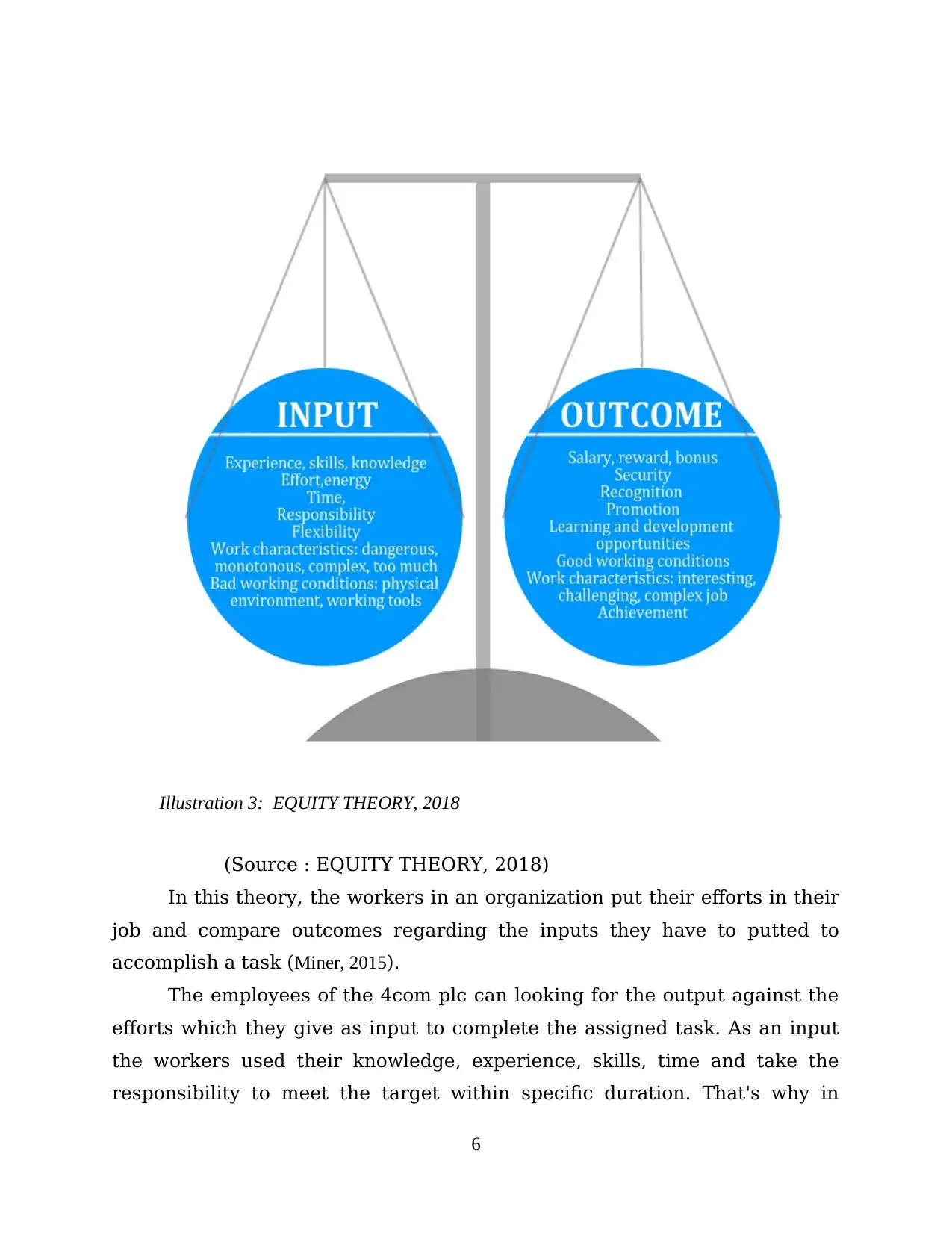
(Source : EQUITY THEORY, 2018)
In this theory, the workers in an organization put their efforts in their
job and compare outcomes regarding the inputs they have to putted to
accomplish a task (Miner, 2015).
The employees of the 4com plc can looking for the output against the
efforts which they give as input to complete the assigned task. As an input
the workers used their knowledge, experience, skills, time and take the
responsibility to meet the target within specific duration. That's why in
6
Illustration 3: EQUITY THEORY, 2018
In this theory, the workers in an organization put their efforts in their
job and compare outcomes regarding the inputs they have to putted to
accomplish a task (Miner, 2015).
The employees of the 4com plc can looking for the output against the
efforts which they give as input to complete the assigned task. As an input
the workers used their knowledge, experience, skills, time and take the
responsibility to meet the target within specific duration. That's why in
6
Illustration 3: EQUITY THEORY, 2018
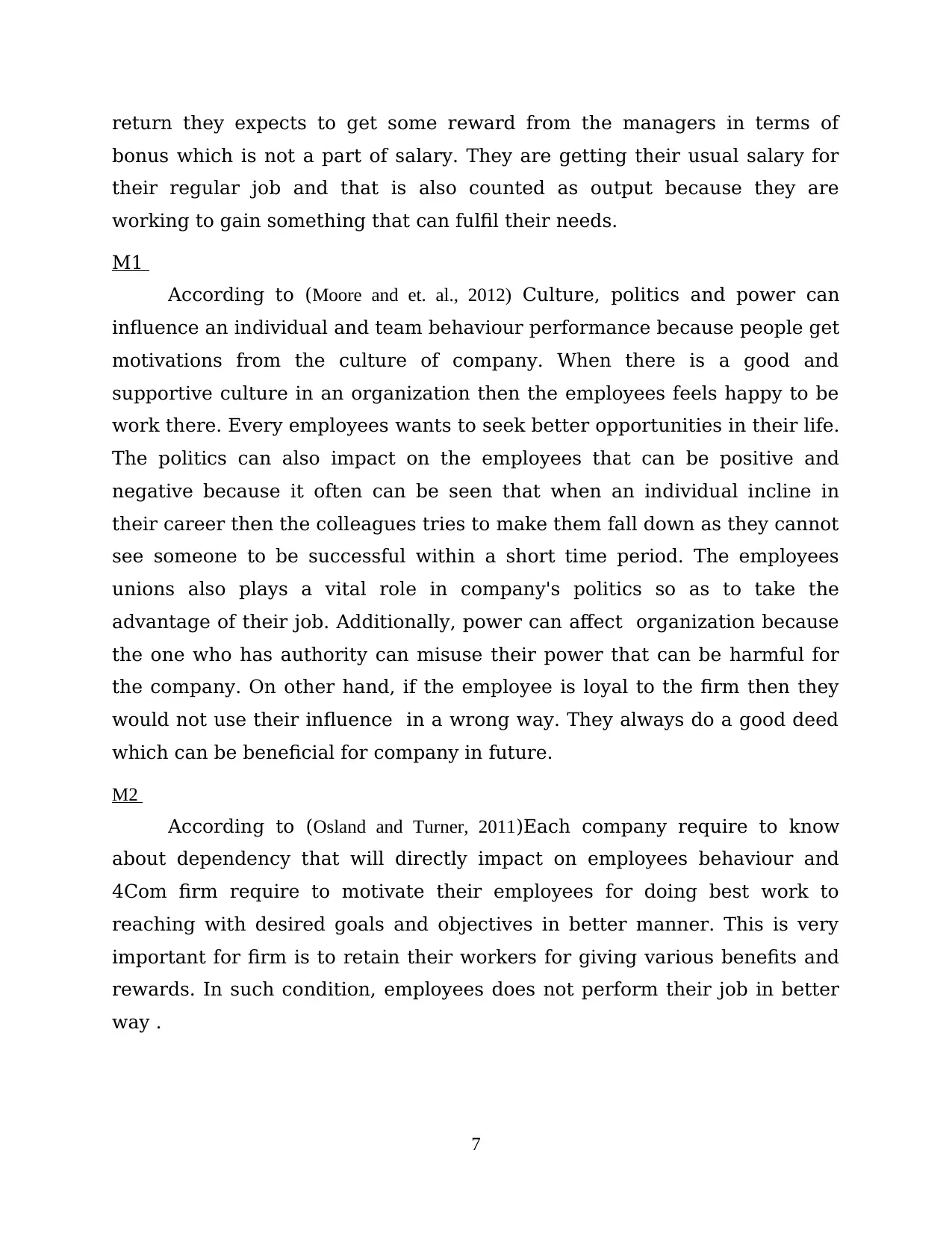
return they expects to get some reward from the managers in terms of
bonus which is not a part of salary. They are getting their usual salary for
their regular job and that is also counted as output because they are
working to gain something that can fulfil their needs.
M1
According to (Moore and et. al., 2012) Culture, politics and power can
influence an individual and team behaviour performance because people get
motivations from the culture of company. When there is a good and
supportive culture in an organization then the employees feels happy to be
work there. Every employees wants to seek better opportunities in their life.
The politics can also impact on the employees that can be positive and
negative because it often can be seen that when an individual incline in
their career then the colleagues tries to make them fall down as they cannot
see someone to be successful within a short time period. The employees
unions also plays a vital role in company's politics so as to take the
advantage of their job. Additionally, power can affect organization because
the one who has authority can misuse their power that can be harmful for
the company. On other hand, if the employee is loyal to the firm then they
would not use their influence in a wrong way. They always do a good deed
which can be beneficial for company in future.
M2
According to (Osland and Turner, 2011)Each company require to know
about dependency that will directly impact on employees behaviour and
4Com firm require to motivate their employees for doing best work to
reaching with desired goals and objectives in better manner. This is very
important for firm is to retain their workers for giving various benefits and
rewards. In such condition, employees does not perform their job in better
way .
7
bonus which is not a part of salary. They are getting their usual salary for
their regular job and that is also counted as output because they are
working to gain something that can fulfil their needs.
M1
According to (Moore and et. al., 2012) Culture, politics and power can
influence an individual and team behaviour performance because people get
motivations from the culture of company. When there is a good and
supportive culture in an organization then the employees feels happy to be
work there. Every employees wants to seek better opportunities in their life.
The politics can also impact on the employees that can be positive and
negative because it often can be seen that when an individual incline in
their career then the colleagues tries to make them fall down as they cannot
see someone to be successful within a short time period. The employees
unions also plays a vital role in company's politics so as to take the
advantage of their job. Additionally, power can affect organization because
the one who has authority can misuse their power that can be harmful for
the company. On other hand, if the employee is loyal to the firm then they
would not use their influence in a wrong way. They always do a good deed
which can be beneficial for company in future.
M2
According to (Osland and Turner, 2011)Each company require to know
about dependency that will directly impact on employees behaviour and
4Com firm require to motivate their employees for doing best work to
reaching with desired goals and objectives in better manner. This is very
important for firm is to retain their workers for giving various benefits and
rewards. In such condition, employees does not perform their job in better
way .
7
⊘ This is a preview!⊘
Do you want full access?
Subscribe today to unlock all pages.

Trusted by 1+ million students worldwide
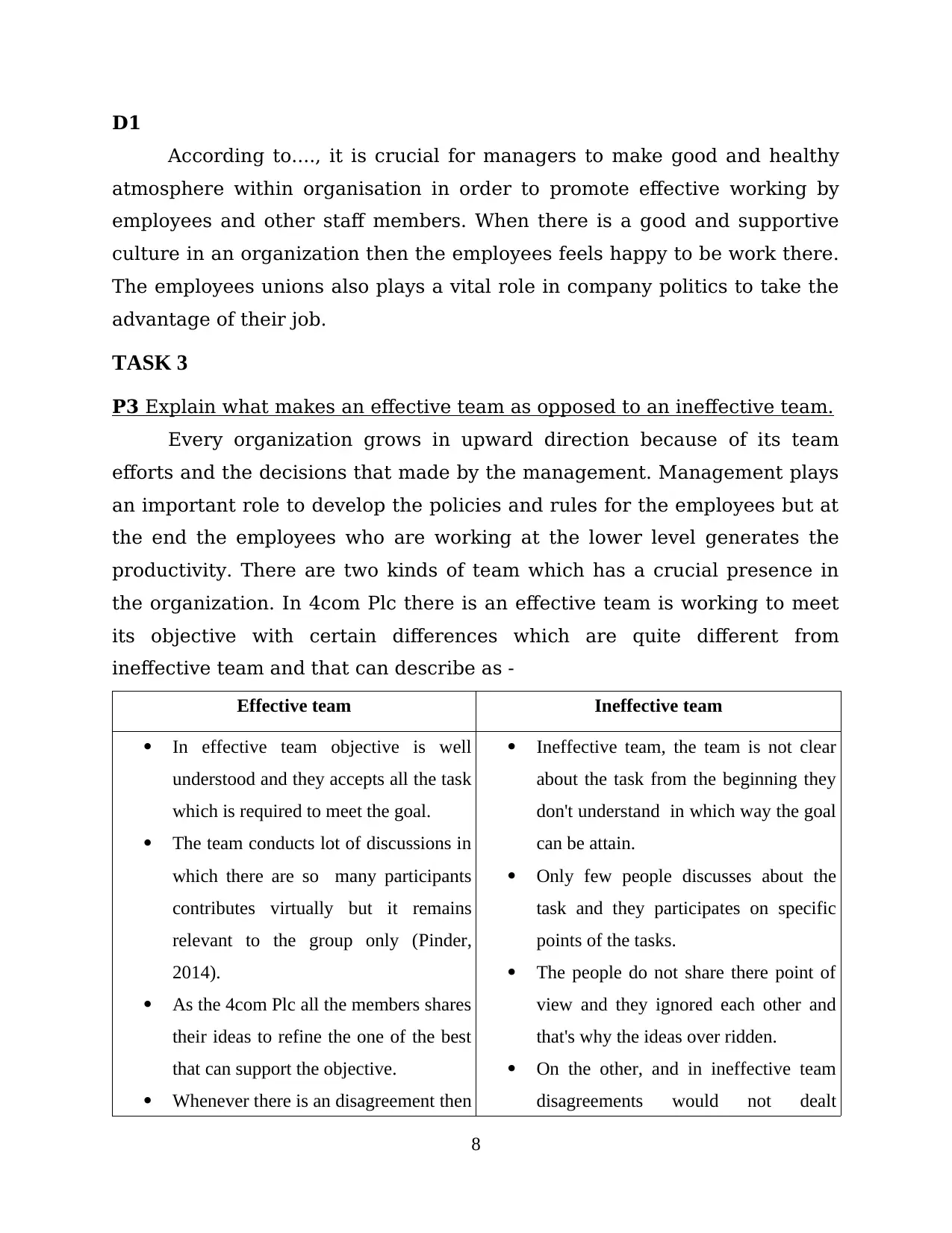
D1
According to...., it is crucial for managers to make good and healthy
atmosphere within organisation in order to promote effective working by
employees and other staff members. When there is a good and supportive
culture in an organization then the employees feels happy to be work there.
The employees unions also plays a vital role in company politics to take the
advantage of their job.
TASK 3
P3 Explain what makes an effective team as opposed to an ineffective team.
Every organization grows in upward direction because of its team
efforts and the decisions that made by the management. Management plays
an important role to develop the policies and rules for the employees but at
the end the employees who are working at the lower level generates the
productivity. There are two kinds of team which has a crucial presence in
the organization. In 4com Plc there is an effective team is working to meet
its objective with certain differences which are quite different from
ineffective team and that can describe as -
Effective team Ineffective team
In effective team objective is well
understood and they accepts all the task
which is required to meet the goal.
The team conducts lot of discussions in
which there are so many participants
contributes virtually but it remains
relevant to the group only (Pinder,
2014).
As the 4com Plc all the members shares
their ideas to refine the one of the best
that can support the objective.
Whenever there is an disagreement then
Ineffective team, the team is not clear
about the task from the beginning they
don't understand in which way the goal
can be attain.
Only few people discusses about the
task and they participates on specific
points of the tasks.
The people do not share there point of
view and they ignored each other and
that's why the ideas over ridden.
On the other, and in ineffective team
disagreements would not dealt
8
According to...., it is crucial for managers to make good and healthy
atmosphere within organisation in order to promote effective working by
employees and other staff members. When there is a good and supportive
culture in an organization then the employees feels happy to be work there.
The employees unions also plays a vital role in company politics to take the
advantage of their job.
TASK 3
P3 Explain what makes an effective team as opposed to an ineffective team.
Every organization grows in upward direction because of its team
efforts and the decisions that made by the management. Management plays
an important role to develop the policies and rules for the employees but at
the end the employees who are working at the lower level generates the
productivity. There are two kinds of team which has a crucial presence in
the organization. In 4com Plc there is an effective team is working to meet
its objective with certain differences which are quite different from
ineffective team and that can describe as -
Effective team Ineffective team
In effective team objective is well
understood and they accepts all the task
which is required to meet the goal.
The team conducts lot of discussions in
which there are so many participants
contributes virtually but it remains
relevant to the group only (Pinder,
2014).
As the 4com Plc all the members shares
their ideas to refine the one of the best
that can support the objective.
Whenever there is an disagreement then
Ineffective team, the team is not clear
about the task from the beginning they
don't understand in which way the goal
can be attain.
Only few people discusses about the
task and they participates on specific
points of the tasks.
The people do not share there point of
view and they ignored each other and
that's why the ideas over ridden.
On the other, and in ineffective team
disagreements would not dealt
8
Paraphrase This Document
Need a fresh take? Get an instant paraphrase of this document with our AI Paraphraser
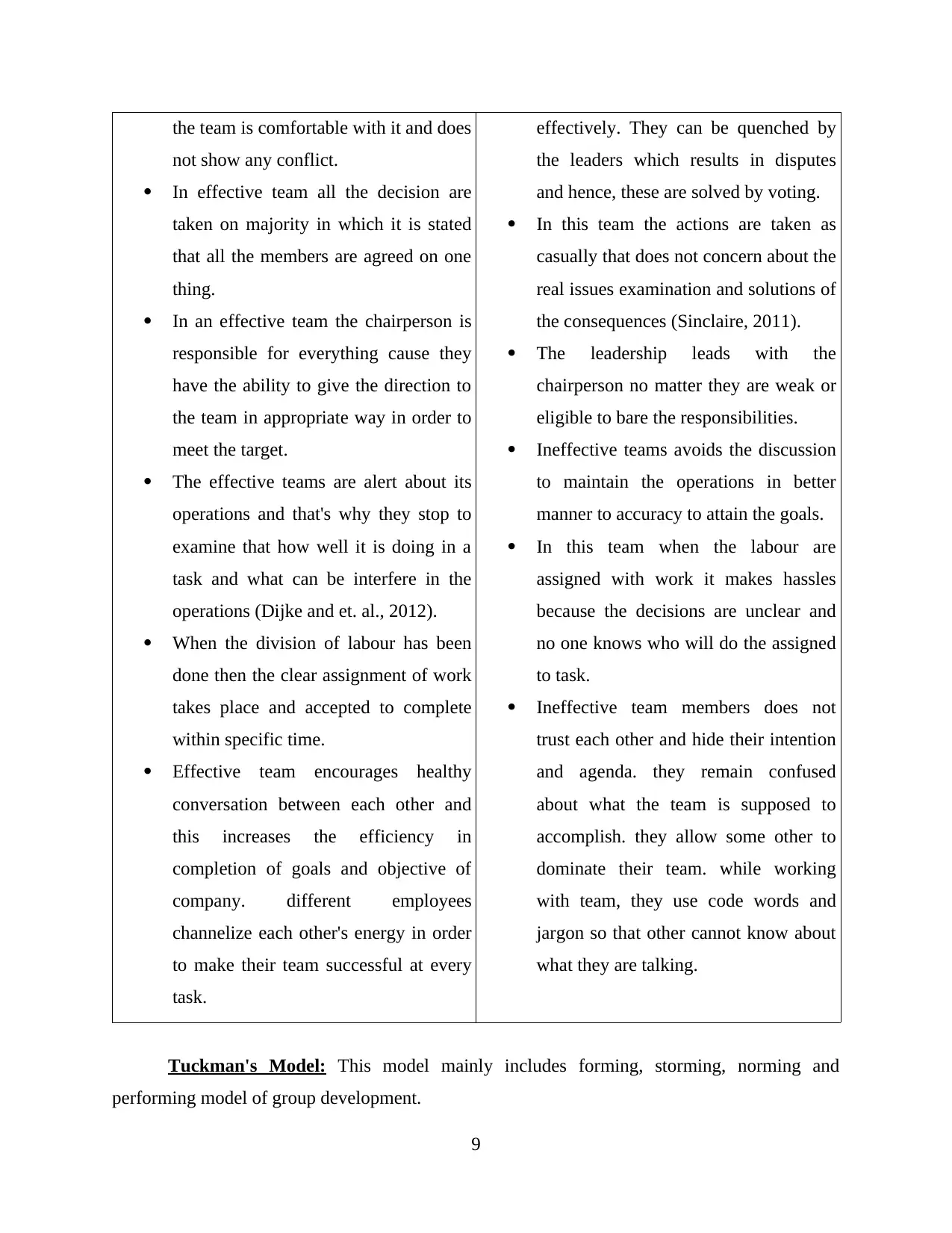
the team is comfortable with it and does
not show any conflict.
In effective team all the decision are
taken on majority in which it is stated
that all the members are agreed on one
thing.
In an effective team the chairperson is
responsible for everything cause they
have the ability to give the direction to
the team in appropriate way in order to
meet the target.
The effective teams are alert about its
operations and that's why they stop to
examine that how well it is doing in a
task and what can be interfere in the
operations (Dijke and et. al., 2012).
When the division of labour has been
done then the clear assignment of work
takes place and accepted to complete
within specific time.
Effective team encourages healthy
conversation between each other and
this increases the efficiency in
completion of goals and objective of
company. different employees
channelize each other's energy in order
to make their team successful at every
task.
effectively. They can be quenched by
the leaders which results in disputes
and hence, these are solved by voting.
In this team the actions are taken as
casually that does not concern about the
real issues examination and solutions of
the consequences (Sinclaire, 2011).
The leadership leads with the
chairperson no matter they are weak or
eligible to bare the responsibilities.
Ineffective teams avoids the discussion
to maintain the operations in better
manner to accuracy to attain the goals.
In this team when the labour are
assigned with work it makes hassles
because the decisions are unclear and
no one knows who will do the assigned
to task.
Ineffective team members does not
trust each other and hide their intention
and agenda. they remain confused
about what the team is supposed to
accomplish. they allow some other to
dominate their team. while working
with team, they use code words and
jargon so that other cannot know about
what they are talking.
Tuckman's Model: This model mainly includes forming, storming, norming and
performing model of group development.
9
not show any conflict.
In effective team all the decision are
taken on majority in which it is stated
that all the members are agreed on one
thing.
In an effective team the chairperson is
responsible for everything cause they
have the ability to give the direction to
the team in appropriate way in order to
meet the target.
The effective teams are alert about its
operations and that's why they stop to
examine that how well it is doing in a
task and what can be interfere in the
operations (Dijke and et. al., 2012).
When the division of labour has been
done then the clear assignment of work
takes place and accepted to complete
within specific time.
Effective team encourages healthy
conversation between each other and
this increases the efficiency in
completion of goals and objective of
company. different employees
channelize each other's energy in order
to make their team successful at every
task.
effectively. They can be quenched by
the leaders which results in disputes
and hence, these are solved by voting.
In this team the actions are taken as
casually that does not concern about the
real issues examination and solutions of
the consequences (Sinclaire, 2011).
The leadership leads with the
chairperson no matter they are weak or
eligible to bare the responsibilities.
Ineffective teams avoids the discussion
to maintain the operations in better
manner to accuracy to attain the goals.
In this team when the labour are
assigned with work it makes hassles
because the decisions are unclear and
no one knows who will do the assigned
to task.
Ineffective team members does not
trust each other and hide their intention
and agenda. they remain confused
about what the team is supposed to
accomplish. they allow some other to
dominate their team. while working
with team, they use code words and
jargon so that other cannot know about
what they are talking.
Tuckman's Model: This model mainly includes forming, storming, norming and
performing model of group development.
9
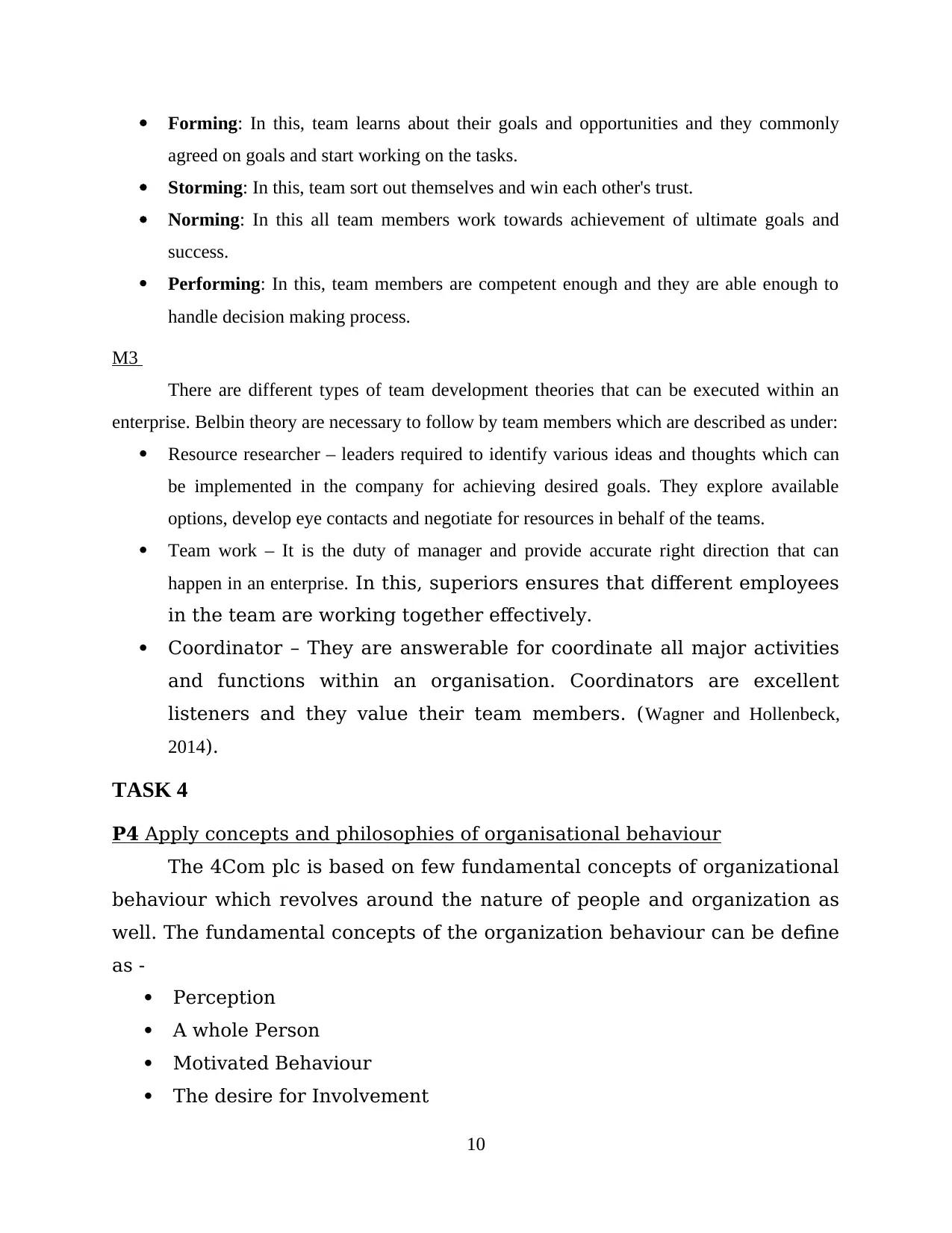
Forming: In this, team learns about their goals and opportunities and they commonly
agreed on goals and start working on the tasks.
Storming: In this, team sort out themselves and win each other's trust.
Norming: In this all team members work towards achievement of ultimate goals and
success.
Performing: In this, team members are competent enough and they are able enough to
handle decision making process.
M3
There are different types of team development theories that can be executed within an
enterprise. Belbin theory are necessary to follow by team members which are described as under:
Resource researcher – leaders required to identify various ideas and thoughts which can
be implemented in the company for achieving desired goals. They explore available
options, develop eye contacts and negotiate for resources in behalf of the teams.
Team work – It is the duty of manager and provide accurate right direction that can
happen in an enterprise. In this, superiors ensures that different employees
in the team are working together effectively.
Coordinator – They are answerable for coordinate all major activities
and functions within an organisation. Coordinators are excellent
listeners and they value their team members. (Wagner and Hollenbeck,
2014).
TASK 4
P4 Apply concepts and philosophies of organisational behaviour
The 4Com plc is based on few fundamental concepts of organizational
behaviour which revolves around the nature of people and organization as
well. The fundamental concepts of the organization behaviour can be define
as -
Perception
A whole Person
Motivated Behaviour
The desire for Involvement
10
agreed on goals and start working on the tasks.
Storming: In this, team sort out themselves and win each other's trust.
Norming: In this all team members work towards achievement of ultimate goals and
success.
Performing: In this, team members are competent enough and they are able enough to
handle decision making process.
M3
There are different types of team development theories that can be executed within an
enterprise. Belbin theory are necessary to follow by team members which are described as under:
Resource researcher – leaders required to identify various ideas and thoughts which can
be implemented in the company for achieving desired goals. They explore available
options, develop eye contacts and negotiate for resources in behalf of the teams.
Team work – It is the duty of manager and provide accurate right direction that can
happen in an enterprise. In this, superiors ensures that different employees
in the team are working together effectively.
Coordinator – They are answerable for coordinate all major activities
and functions within an organisation. Coordinators are excellent
listeners and they value their team members. (Wagner and Hollenbeck,
2014).
TASK 4
P4 Apply concepts and philosophies of organisational behaviour
The 4Com plc is based on few fundamental concepts of organizational
behaviour which revolves around the nature of people and organization as
well. The fundamental concepts of the organization behaviour can be define
as -
Perception
A whole Person
Motivated Behaviour
The desire for Involvement
10
⊘ This is a preview!⊘
Do you want full access?
Subscribe today to unlock all pages.

Trusted by 1+ million students worldwide
1 out of 19
Related Documents
Your All-in-One AI-Powered Toolkit for Academic Success.
+13062052269
info@desklib.com
Available 24*7 on WhatsApp / Email
![[object Object]](/_next/static/media/star-bottom.7253800d.svg)
Unlock your academic potential
Copyright © 2020–2026 A2Z Services. All Rights Reserved. Developed and managed by ZUCOL.





